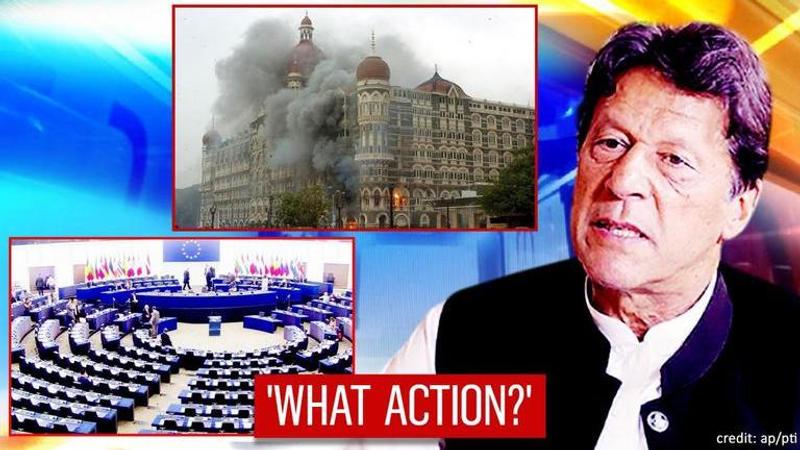Published 12:55 IST, November 26th 2020
EU Parliamentarians write to Imran; ask what Pakistan has done against 26/11 perpetrators
Criticising Pakistan for not punishing those who orchestrated the 2008 Mumbai terror attack, two Members of European Parliament (MEP) have written to Imran Khan

Criticising Pakistan for not punishing those who orchestrated the 26/11 2008 Mumbai terror attack, two Members of European Parliament (MEP) have written to Pak PM Imran Khan. In a letter to Khan on November 24, Polish MEP Ryszard Czarnecki and Italian MEP Fulvio Martusciello requested to know what action has Pakistan taken against "Lashkar-e-Taiba, the terrorist organisation, based in Pakistan, known to have carried out the multiple shooting and bombing attacks that happened in Mumbai in 2008?".
'What action is Pakistan taking?'
According to EU Chronicle, they further asked, "what action has, and is, Pakistan taking against terrorist groups operating within the country in general?" On November 26, 2008, ten terrorists of Pakistan-based Lashkar-e-Taiba (LeT) carried out 12 coordinated shooting and bombing attacks lasting four days across Mumbai. At least 166 people, including foreigners, were killed and over 300 others were injured in the attacks. In these gruesome attacks, nine terrorists were killed and the lone survivor, Ajmal Amir Kasab, was caught and was sentenced to death at Yerwada Central Jail in Pune in 2012. On November 11, 2012, Kasab was hanged in Yerawada Jail in Pune.
Pakistani authorities continue to deny culpability and are yet to take action on the multiple dossiers shared by India. In a reminder to Khan, a Prime Minister who delivered a eulogy to Osama Bin Laden, hailing him as a “martyr” in May this year, the two MEPs stated, “Terrorism is the unlawful use of violence and intimidation, especially against civilians, often in pursuit of political or ideological aims." They added that as "European politicians, we are committed to fighting against terrorism and extremist violence. We all have a responsibility to condemn terrorism and bring to justice those who perpetrate such actions."
'It is important to condemn these violent acts'
Czarnecki and Martusciello highlighted in their letter to Khan, "On 26 November 2008, an extremist terrorist organisation, Lashkar-e-Taiba, based in the Islamic Republic of Pakistan, claimed responsibility for the Mumbai bombings in which 166 innocent people were murdered, nine attackers killed, and more than 300 individuals sustained injuries."
"Subsequent documented evidence from United States intelligence reports, from India's intelligence services including DNA, photographs and identification of the origins of the attackers; and an admission by Pakistan's former Prime Minister Nawaz Sharif's of the country's involvement in the crimes; highlight the engagement of accomplishes in Pakistan. However, to date, the senior coordinators and promoters who orchestrated the attacks remain at large," they added.
As Europe also suffers from the impacts of horrific acts of increasingly radical and extremist jihadi attacks, the politicians said it was "essential that justice is served on those who have carried out, instructed or supported such terrorist activities. It is equally important that leaders of countries publicly condemn these acts of violence and proceed to ensure justice is done for the victims, by apprehending and sentencing the perpetrators."
Full letter to Pakistan PM Imran Khan by European Parliament Members
To
Mr. Imran Khan
Prime Minister
Islamic Republic of Pakistan
24th November 2020
Dear Prime Minister Imran Khan,
On 26 November 2008, an extremist terrorist organisation, Lashkar-e-Taiba, based in the Islamic Republic of Pakistan, claimed responsibility for the Mumbai bombings in which 166 innocent people were murdered, nine attackers killed, and more than 300 individuals sustained injuries. Subsequent documented evidence from United States intelligence reports, from India’s intelligence services including DNA, photographs and identification of the origins of the attackers; and an admission by Pakistan’s former Prime Minister Nawaz Sharif’s of the country’s involvement in the crimes; highlight the engagement of accomplishes in Pakistan. However, to date, the senior coordinators and promoters who orchestrated the attacks remain at large.
In any terrorist’s attack, including those Pakistan has witnessed recently in its own country, hundreds of families suffer through the death or injury of a loved one. Furthermore, individuals of the emergency services who are forced to witness the horrors resulting from these attacks also risk being harmed or suffering long term psychological damage. It is in everyone’s interests to stop terrorism.
As you are well aware, Europe is also suffering from the impacts of horrific acts of terrorism at this current time and thus expresses sympathy with those who are forced to commemorate anniversaries of such tragedies. It is therefore essential that justice is served on those who have carried out, instructed or supported such terrorist activities. It is equally important that leaders of countries publicly condemn these acts of violence and proceed to ensure justice is done for the victims, by apprehending and sentencing the perpetrators.
Terrorism is the unlawful use of violence and intimidation, especially against civilians, often in pursuit of political or ideological aims. As European politicians, we are committed to fighting against terrorism and extremist violence. We all have a responsibility to condemn terrorism and bring to justice those who perpetrate such actions.
As Members of the European Parliament, we write to you to ask what action Pakistan has taken against Lashkar-e-Taiba, the extremist Islamist terrorist organization, based in Pakistan, known to have carried out the multiple shooting and bombing attacks that happened in Mumbai in 2008? Additionally, what action has, and is, Pakistan taking against terrorist groups operating within the country in general?
Whilst the former Prime Minister of Pakistan has alluded to Pakistan’s role in the terrorist activities of 2008, it is vital that the victims have closure when the due process is carried out through the judiciary system and the actions of the assailants and their accomplices is condemned by state leaders through their actions to prevent impunity.
Signed by Members of the European Parliament
Mr. Ryszard Czarnecki, Member of the European Parliament
2. Mr. Fulvio Martusciello, Member of the European Parliament
Updated 12:55 IST, November 26th 2020




